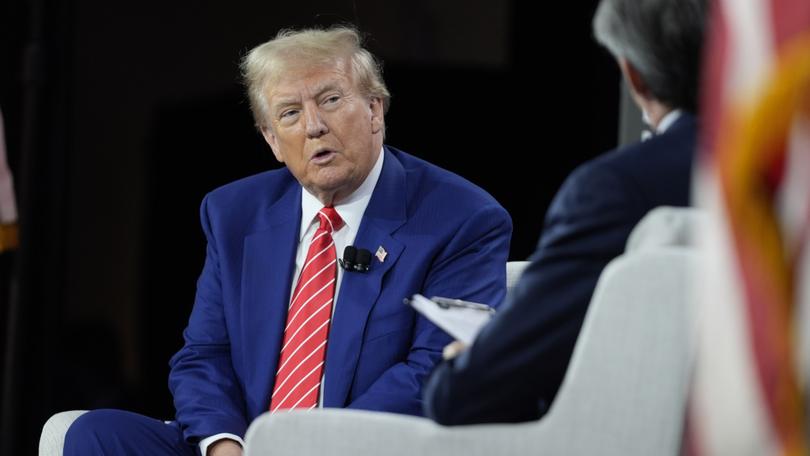Donald Trump labelled peaceful ‘compared with Venezuela’ at Economic Club speaking event
Former president Donald Trump was involved in a heated clash at a speaking event at the Economic Club in Chicago, where he claimed his 2021 transfer of presidential power was ‘very peaceful’.

Former president Donald Trump did not directly respond to a question about whether he would respect and encourage a peaceful transfer of power after the election, and he falsely claimed that “you had a peaceful transfer of power” in 2021 when a violent mob assaulted the US Capitol.
Speaking to an audience of mostly business people at the Economic Club in Chicago, Mr Trump was interviewed by Bloomberg News editor in chief John Micklethwait about economic policies, but towards the end of the hour-long question-and-answer session, he took issue with Mr Micklethwait’s questioning on politics and democracy.
“It was love and peace,” Mr Trump said of the deadly January 6, 2021, insurrection in which Trump supporters trying to stop the affirmation of Joe Biden’s win assaulted 140 police officers, damaged the Capitol and destroyed government property.
Sign up to The Nightly's newsletters.
Get the first look at the digital newspaper, curated daily stories and breaking headlines delivered to your inbox.
By continuing you agree to our Terms and Privacy Policy.Mr Trump continued to falsely assert that the 2020 election was stolen and inaccurately described the reason for his failure to prove his claims in court.
“If you think an election is crooked, and I do 100 per cent, if you think the day it comes when you can protest, you take a look at the Democrats, they protested 2016,” Trump said, veering off topic as he repeatedly did on questions throughout the event.
“We want to have honest elections.”
Democrats, led by presidential nominee Hillary Clinton, accepted the results of the 2016 election.
In his remarks, Trump pushed falsehoods about January 6.
He said the attack involved about 500 to 700 people; in fact, more than 1,500 people have been charged with federal crimes involving the attack, according to the Justice Department.
He said no one died from the violent riot except Trump supporter Ashli Babbitt. Ms Babbitt was one of five people who authorities said died as a result of the siege.
Mr Trump said no one who went to the Capitol on January 6 had a gun. Several people were charged with carrying guns and other weapons, such as axes, hatchets and knives.
When Mr Micklethwait pointed out that Trump’s court cases challenging the results of the election in several key states were thrown out, Trump falsely claimed that courts rejected the cases on a technical issue of who was allowed to bring the case, also called standing.
Many 2020 election lawsuits filed by Trump and his allies were rejected on the merits by judges across the political spectrum.
Trump maintained that it was a peaceful transfer of power because he left Washington on Jan. 20, breaking with precedent and skipping the inauguration of his successor.
“I left the morning that I was supposed to leave. I went to Florida. And you had a very peaceful transfer,” he said.
Mr Trump’s comments about what happened in 2021 mirror similar remarks by his running mate, Sen. JD Vance (Ohio), in Pennsylvania last weekend.
Mr Vance acknowledged that “there was a riot at the Capitol on January 6, but there was still a peaceful transfer of power in this country, and that is always going to happen.”
Mr Micklethwait pressed Trump on whether he would “commit now to respecting and encouraging a peaceful transfer of power” if he loses in November.
When Trump said the transfer of power in 2021 was peaceful, Mr Micklethwait said it was peaceful “compared with Venezuela, but it was by far the most, the worst transfer of power for a long time,” drawing boos from some in the audience.
Mr Trump said Mr Micklethwait may be biased against him, saying he “has not been a big Trump fan”.
Vice President Kamala Harris was also invited to be interviewed but had so far declined, Mr Micklethwait said.
Several attendees who said they are voting for Mr Trump said they agreed with his answer that 2021’s transfer of power was peaceful, pointing to the part of Trump’s speech on January 6 on the Ellipse when he told the audience that they should “peacefully and patriotically make your voices heard.”
Mr Trump also told the crowd: “If you don’t fight like hell you’re not going to have a country anymore.”
Weeks later, the US House impeached Mr Trump on a charge of “incitement of insurrection”; he was acquitted by the Senate.
After Mr Trump’s interview at the economic club, Robert Hershenhorn, a supporter in attendance, said the attack on the Capitol wasn’t fairly investigated by the House select committee and that Republicans have not had their voices heard on the issue.
Asked by a reporter about the Republicans, including Mr Trump’s former aides, who testified to the committee, Mr Hershenhorn walked away.
The Rev. Corey Brooks, a Chicago pastor who gave a closing prayer at the Republican National Convention in July, said that while some people may like to hear Mr Trump commit to a peaceful transfer of power, many of his supporters know that he would accept the results of the election without violence.
“He’s a patriot, and that’s what patriots do,” Brooks said.
“So I don’t foresee there being any problems. But as far as I’m concerned, I hope it does not even come to that. I hope the president, the former president, wins.”
© 2024 , The Washington Post
